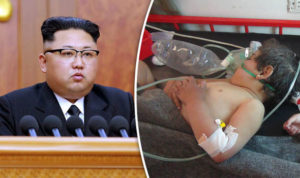


Trump’s Tomahawk attack in April doesn’t seem to have deterred Assad’s effort to rebuild a chemical arsenal. Kim Jong Un is helping. And Tehran may be paying.
A new United Nations report detailing chemical arms-related shipments from North Korea to Syria raises one big unanswered question: Who finances such illegal weapons deals?
After all, the Syrian government of Bashar al-Assad has very few financial resources of its own, and North Korea’s Kim Jong Un is known to use illicit sales of military wares to help bypass international sanctions targeting his country’s legitimate exports, and to finance his grip on power.
In the past, one of Assad’s strongest supporters, Iran, has been suspected of financing arms deals between Syria and North Korea. Separately, the Islamic Republic reportedly has cooperated with North Korea in developing nuclear- and missile-related armaments.
Iran’s military involvement supporting the Assad regime in Syria, as well the growing military presence of the Iranian Revolutionary Guard Corps and Iranian proxy militias in Lebanon, Iraq, Yemen, and all the way to Afghanistan, has worried rival Sunni regimes in the region, as well as Israel and, increasingly, the United States.
So did the Iranians finance the chemical shipment described in the UN report?
“It’s plausible that Assad’s largest financial and military backer would have paid for the shipment,” said Mark Dubowitz, CEO of the Foundation for Defense of Democracies, and one of the most prominent critics of the Iran regime in Washington.

